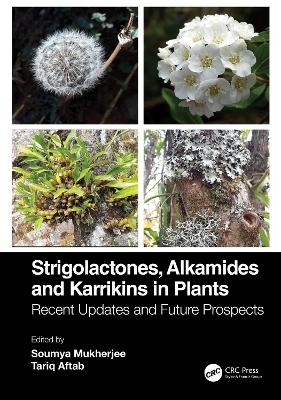
Strigolactones, Alkamides and Karrikins in Plants
CRC Press (Verlag)
978-1-032-12433-9 (ISBN)
Strigolactones, Alkamides and Karrikins in Plants: Recent Updates and Future Prospects provides comprehensive knowledge on the various aspects of plant growth, physiology, and communication associated with the three potential biomolecules. Strigolactones have gained much importance in the last decade as potential plant growth regulators. Likewise, alkamides are also known for their plant growth regulatory and pharmacological properties. The evolutionary signi□ficance of karrikins as a potential signaling molecule in different plant groups has been fascinating to plant physiologists and ecologists. This book enables the reader to gain insights into the myriad role of these biomolecules in plant physiology in normal and challenging environments.
The book offers comprehensive coverage of the most essential topics, including:
Regulation of strigolactone biosynthesis
Strigolactones and plant stress tolerance
Strigolactones and parasitic plants
Alkamides and plant-microbe interaction in rhizosphere
Pharmacological potential of alkamides
Molecular associations of strigolactones and karrikins
Karrikins in plant biotechnology
Commercial realities of karrikins in biodiversity restoration
In reference to the recent findings in the □field, the authors have provided insights into the role of each biomolecule and analyzed the future prospects of each cover area.
The present book is the first of its kind, in which the three molecules have been integrated as potential regulators of plant signaling, communication, and physiology in adverse conditions. Karrikins in plant biology is an emerging field in which its inter-relationship with strigolactones shall pave the way to future investigations of the molecular mechanisms of plant stress tolerance, regulation of root system architecture, and crop yield.
Soumya Mukherjee has accomplished his Ph.D from the Department of Botany, University of Delhi. He has been as ex faculty of Ramjas College, University of Delhi. Currently he is employed as a faculty in the Department of Botany, Jangipur College, University of Kalyani, West Bengal. He has worked as a CSIR- research fellow in the area of abiotic stress physiology of plants. He has published both research and review articles in various peer-reviewed international journals. He is serving as an associate editor in the editorial board of Plant signalling and Behaviour (Taylor and Francis). He has authored e-learning module in Plant Physiology and Biochemistry published as an effort of National Mission on Education through ICT (MHRD Project undertaken by University of Delhi). He has acted as a subject reviewer of some peer reviewed international journals on plant science. Currently he is focused on undergraduate teaching to Botany (Hons.) and Life Science students in various fundamental aspects areas of Plant Physiology. He continues to work with research interests in salt-stress physiology associated with the aspects of hormone signalling, and biomolecular crosstalk mechanisms in plants. Tariq Aftab received his Ph.D. in the Department of Botany at Aligarh Muslim University, India, and is currently an Assistant Professor there. He is the recipient of a prestigious Leibniz-DAAD fellowship from Germany, Raman Fellowship from the Government of India, and Young Scientist Awards from the State Government of Uttar Pradesh (India) and Government of India. After completing his doctorate, he has worked as Research Fellow at National Bureau of Plant Genetic Resources, New Delhi and as Post-doctorate Fellow at Jamia Hamdard, New Delhi, India. Dr. Aftab also worked as Visiting Scientist at Leibniz Institute of Plant Genetics and Crop Plant Research (IPK), Gatersleben, Germany, and in the Department of Plant Biology, Michigan State University, USA. He is a member of various scientific associations from India and abroad. He has edited several books with international publishers, including Elsevier Inc., Springer Nature and CRC Press (Taylor & Francis Group), co-authored several book chapters, and published over more than 60 research papers in peer-reviewed international journals. His research interests include physiological, proteomic, and molecular studies on medicinal and aromatic plants.
Preface
Introduction
Section I: Strigolactones in Plant Biology
1. Biosynthetic regulation of strigolactones in plants
2. Roles of Strigolactone in Plant Growth and Development
3. Strigolactones; Regulators of Root Development
4. Regulatory roles of Strigolactones in Drought tolerance in plants
5. Strigolactones in plants: Web networking with phytohormonal crosstalk
6. Strigolactone in Abiotic Stress Tolerance of Crop Plants
7. Host – Parasitic Plant Interaction: The Key Role of Strigolactones
Section II: Alkamides- Ecophysiological and pharmacological perspectives
8. Alkamides and humic acids: Insights to soil fertility
9. Alkamides in Root Development
10. Alkamides and Plant Microbe Interactions in Rhizosphere: Current Status & Future Perspectives
11. Humic acids and fatty acid amides: soil-plant interactions
12. Alkamides symbiosis in plants as source of new antibiotics
13. Alkamides as metabolites in plants
14. Pharmacological potential of plant-derived alkylamides
Section III: Karrikins in Plant Biology
15. Karrikins: Molecular Association with Strigolactones: Role in Plant Growth Regulation, and Quorum Sensing Modulation
16. Induction of dormancy release in agricultural weed seeds by plant-derived smoke and smoke-derived karrikin 1 (KAR1) – a relationship with plant hormones
17. Application of smoke-water and KAR1 in plant biotechnology
18. The role of karrikins to address pressing global challenges: plant abiotic stress tolerance, biodiversity restoration and karrikin commercial realities
| Erscheinungsdatum | 17.07.2023 |
|---|---|
| Zusatzinfo | 13 Tables, black and white; 36 Line drawings, color; 15 Line drawings, black and white; 36 Illustrations, color; 15 Illustrations, black and white |
| Verlagsort | London |
| Sprache | englisch |
| Maße | 178 x 254 mm |
| Gewicht | 780 g |
| Themenwelt | Naturwissenschaften ► Biologie ► Botanik |
| Technik | |
| Weitere Fachgebiete ► Land- / Forstwirtschaft / Fischerei | |
| ISBN-10 | 1-032-12433-4 / 1032124334 |
| ISBN-13 | 978-1-032-12433-9 / 9781032124339 |
| Zustand | Neuware |
| Informationen gemäß Produktsicherheitsverordnung (GPSR) | |
| Haben Sie eine Frage zum Produkt? |
aus dem Bereich


